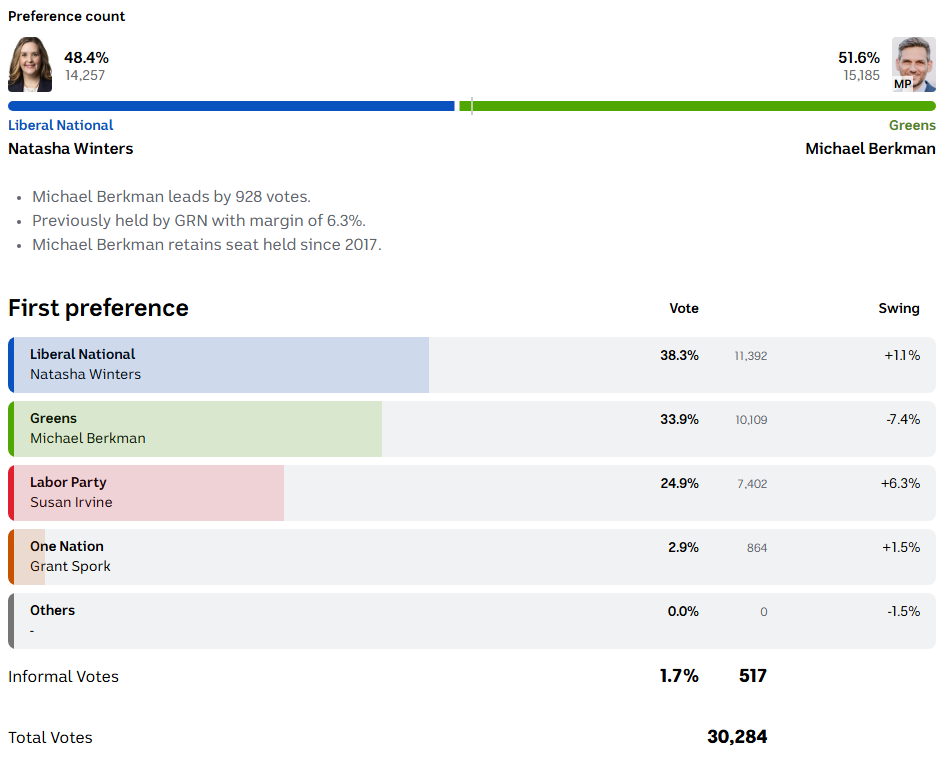Transcription
Preference count
57.0% (14,915) Labor Party Barbara O'Shea
43.0% (11,254) Greens Amy MacMahor (MP)
- While the Labor Party is well ahead on the two-candidate preferred count for South Brisbane, there remains a possibility that the LNP will pass Labor on postal votes and the flow of One Nation preferences. Were Labor to slip to third, Labor preferences would re-elect Greens MLA Amy MacMahon. Monday's counting of Absent votes narrowed the primary vote percentage gap between Labor and the LNP from 2.7% to 2.3%.
- Barbara O'Shea leads by 3,661 votes.
- Previously held by GRN with margin of 5.3%.
| First preference |
Vote |
Swing |
| Greens Amy MacMahon |
35.1% (10,119) |
-2.8% |
| Labor Party Barbara O'Shea |
31.9% (9,221) |
-2.5% |
| Liberal National Marita Parkinson |
29.7% (8,560) |
+6.8% |
| One Nation Richard Henderson |
3.3% (946) |
+1.6% |
| Others - |
0.0% (0) |
-3.1% |
Informal Votes 2.3% (689)
Total Votes 29,535
Results taken from the Qld 2024 Election results for South Brisbane on the ABC 29/10/2024.
I need to preface this by saying that while I prefer proportional systems, if you're going to have a single-winner system I have never seen one I prefer over IRV.
Some context for those not familiar with Australian politics: by coincidence, the parties here are ranked by first preference in order from left to right. As a general rule Greens voters will prefer Labor over anyone else, and most Labor voters will vote 2 Greens. One Nation voters mostly vote 2 for Liberal National (LNP). And most LNP voters will vote Labor before Greens. But some voters are weird: you will see people who vote 1 One Nation, 2 Greens or Labor; etc.
Obviously as advocates of IRV, we usually talk about how it lets you vote honestly without worrying about strategic voting or the fear that your honest vote may increase the chance of your least-favourite candidate winning. I think this is a result that shows the interesting, rare corner case where that isn't entirely true. It's not an argument for going back to FPTP, because it's still much rarer and less destructive than it is there.
In this case, One Nation will obviously be eliminated first and their votes distributed in a way that could prove kingmaker, but doesn't directly affect this discussion.
What actually matters is where the LNP finishes, once all votes have been counted and One Nation votes redistributed. If the LNP stays where they are in third, the LNP will be eliminated and most likely their votes will be redistributed to help Labor win. If the LNP can squeeze just a few more votes out (very possible, given many of the uncounted votes are probably early and postal votes—and the fact that the LNP was doing much better in the polls up until a few days before the election) and finish in 2nd, Labor will be eliminated, and their preferences will likely result in the Greens being elected.
Since most LNP votes would prefer to see Labor win than the Greens, an LNP voter would actually prefer that their candidate finish in third than in 2nd. They would have been better of voting dishonestly for Labor 1st.
A quick aside: One Nation voters could prove kingmaker because if all of them fit the mould of the modal One Nation voter, the LNP would easily fit in 2nd, resulting in a Greens win. Thus, a strategic One Nation voter with full prior knowledge should vote 2 Labor instead of 2 LNP, 3 Labor.
Of course, this should not be construed as an argument against IRV. It requires prior knowledge of how the electorate will vote to take advantage of it, which is a far cry from how easy and even inevitable strategic voting is under FPTP. Look at the seat of Maiwar just across the river, where the Greens are likely to win but the LNP is very, very close and could possibly still get over the line based on postal votes.

If LNP voters were to vote strategically here in the same way I am suggesting South Brisbane voters should, it would remove that chance that the LNP could end up actually winning.
And then there's also the fact that in South Brisbane, the LNP was never going to win either way, and they don't care too much whether it's Labor or Greens. They probably care more about the funding that parties get based on how many first preference votes they receive.
TL;DR right-wing LNP voters could have voted strategically to increase the chance the centrist Labor will win rather than the left-wing Greens.

